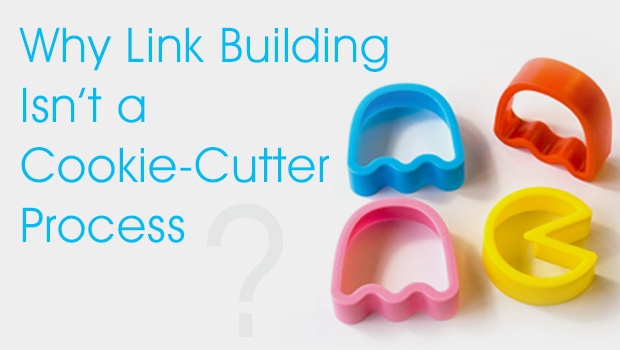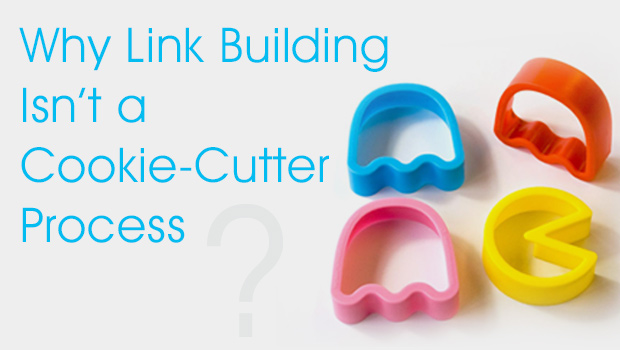
If you’ve been doing link building for a significant amount of time, you already know that it’s not a simple or linear process. Even so, it’s easy to fall victim to habit or convince ourselves that there’s only one “right” way to do things. That’s why we’ve put together this post to remind ourselves why we should never allow ourselves to fall into that mindset. We recommend reading this every six months, just to remind ourselves. Here are six reasons link building isn’t a cookie-cutter process.
1. Repeatable Means Replaceable
If your link building strategy can be explained in less than ten minutes with a series of easy to follow instructions, it means that your link building strategy is easy to copy, and that’s bad news. Anything that can be easily copied can also be easily scaled, and that means that you will always be up against competitors who can beat you simply by spending more money on labor.
In principle, any strategy can be copied, so that’s not the primary concern here. The concern is that your strategy is easy to copy, meaning that your skill set is expendable.
2. The Search Engines Change
What works today doesn’t always work tomorrow. Panda and Penguin have proven this beyond a doubt. Once upon a time, any link would do the trick. But as time has passed we’ve seen the devaluation of paid links, automated links, widget links, comment links, site-wide links, article directory links, press releases, and more.
Link building demands an understanding of the search engine’s motives and business interests, as well as knowledge of how technological advances and internet culture are in motion. It also demands an understanding of where the online marketing industry is in terms of resources, approach, and regard for the common consumer. The behavior of your peers has just as much influence on what works as your own behavior does.
3. Outreach Isn’t Mechanistic
Every human being is different, and it’s impossible to build relationships according to some predetermined algorithm.
Influence is a key factor when it comes to your ability to attract links. You need to be able to persuade influencers to spend their important time listening to you, taking a look at your content, collaborating with you, and linking to you. Imagine if there were a simple 10 step process you could follow that would instantly make every person you contacted like and trust you. Such a process will never exist.
(At least, not without some nuance that takes into account how every person reacts differently).
You can learn to connect with people and earn their trust. It’s a learnable skill. But it’s not something that can be easily summed up and there’s no “trick” to it. It’s about being natural and approaching people like human beings, listening and understanding their unique needs, and offering value to them.
4. There is No “Ideal” Content Format
Link building almost always involves the production of content, and it’s indisputable that the content needs to be great, if not amazing. But what counts as “amazing” is going to change depending on your situation, the resources you have, what the competition looks like, and what you’re trying to sell.
On top of that, content comes in loads of different formats:
- Whitepapers
- Infographics
- Blog posts
- Videos
- Photographs
- Artwork and design
- eBooks
- Podcasts
- Guides
- Social media comments
- Q&A or forum activity
- Software and tools
- Surveys
- Original research
- Graphs and data
…and on and on. To even consider the possibility that the strategy for each of these mediums can be boiled down to a simple process is madness. Not only is every medium different, but the optimal choice of medium is going to depend on your target audience, resources, and innumerable other factors.
Sometimes content works best as a story, other times it works best as a guide. Sometimes instructive content works best, other times entertainment is much more useful. There are times when users will want something interactive, and times when they would prefer to sit and learn. Suspense is a great way to boost user engagement, except sometimes your user just wants you to give them the answer right away. Short and sweet is the road to the masses, but the masses aren’t always your target audience.
Content production is immensely complex, and there is no way to describe it linearly.
5. Every Niche is Different
This is a big one, and sometimes it’s easy to forget. As SEOs, sometimes we forget that not every industry is like our own industry. The SEO industry loves to link to enormous informative posts that tell us everything there is to know and teach us something new. Not every industry is like that. Not every target audience is interested in how-tos, and not all industries offer a plethora of reputable blogs that readily accept guest posts.
Some niches may be popular in the physical world but lack a massive online audience. In this case, you might need to think a little more broad and build connections with online communities that might not be directly on-point.
Some niches may be so ridiculously popular that you really have to narrow things down to near-obscurity before you can find a niche with acceptable competition. This means you’ll need to hyper-specialize and really become the expert on a single micro-topic.
Certain subjects are “web-friendly.” They lend themselves to humor easily, fit “geek culture,” and are likely to go viral on sites like Reddit and YouTube in a way that doesn’t seem awkward or forced.
Other subjects aren’t so friendly to the web. They may be very business-centric or informational. Attempting to make them more entertaining may come off as excessive pandering, or as dumbing down the material. In that case you’ll need to target more precise internet sub-cultures that do take an interest in the subject, and focus on going viral strictly within those small communities.
You can’t tell a B2B client to start pumping out viral cat videos any more than you can tell TMZ that they need to start producing more infographics. The optimal strategy absolutely depends on your niche. Don’t assume that just because it works for one client that it’s going to work for another one.
And that also brings us to our next point.
6. Every Client is Different
A small local business might be happy to see their web traffic reach 100 visitors a day. A massive conglomerate might be upset with even 1,000 times that.
If you’re working with promising clients, then you’re working with clients who have a unique selling proposition. That means, by definition, if you’re working with good clients, your clients shouldn’t resemble each other very much.
Guest posts and relationships with mid-list bloggers might be more than enough for a small business with limited resources. A huge corporation with deep pockets, on the other hand, may never be satiated with the kind of results you get from these tactics, instead demanding overwhelmingly positive results.
Some clients may be very open and more interested in growth than ROI. They may find it very exciting to produce content and tools that dramatically enhance brand awareness, even if the short term results actually reduce profit. This allows you to focus on high traffic strategies like viral content that’s not necessarily right on topic.
Other clients may abhor the idea, fear repercussions from the shareholders, or generally be averse to any campaign that doesn’t result in short term profits. In this case you may need to get more targeted, focus less on virality, and make sure that your campaigns lead to conversions in the short term.
Conclusion
We all know that link building isn’t a simple, linear process, but sometimes we find ourselves falling into habits that treat it as though it were. Every once in a while we need to shake things up and try something new, reminding ourselves that the “best way to do things” is a moving target. Don’t get stuck in black and white thinking. Keep an open mind and approach each new goal with creativity and innovation.


